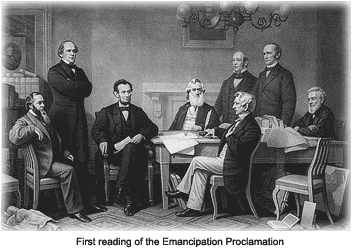Early in the war President Lincoln was careful to stress he was fighting to preserve the Union, not for the abolition of slavery. On two occasions he overruled military commanders who had abolished slavery in areas they controlled. He treaded with great care on the matter because of the importance of preserving the loyalty of the slave-owning Border States.

In September 1862, shortly after the Battle of Antietam, Lincoln issued a preliminary emancipation proclamation. As of January 1, 1863, all slaves were to be freed in those areas still in rebellion against the federal government. He repeated his oft-stated positions that he was dedicated to restoring the Union and not ending slavery entirely, and that he supported the concept of compensated emancipation.
Criticized by some for not abolishing slavery everywhere, Lincoln argued that he did not have the power to do so; only Congress and the Border States had that authority.
Reaction in the South was predictable. Many claimed that they had known all along that Lincoln was an abolitionist. Others feared that the Proclamation would touch off a series of slave rebellions.
By issuing the Proclamation, Lincoln addressed several issues:
Lincoln and the Radical Republicans feared that emancipation might not pass constitutional muster after the war. This pushed them toward a permanent fix which they found in the Thirteenth Amendment, which was passed by the Senate in April 1864. House approval did not come until January 1865 and ratification by the states in December 1865.
And by virtue of the power, and for the purpose aforesaid, I do order and declare that all persons held as slaves within said designated States, and parts of States, are, and henceforward shall be free; and that the Executive government of the United States, including the military and naval authorities thereof, will recognize and maintain the freedom of said persons.By the President: ABRAHAM LINCOLN WILLIAM H. SEWARD, Secretary of State.